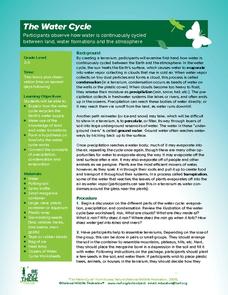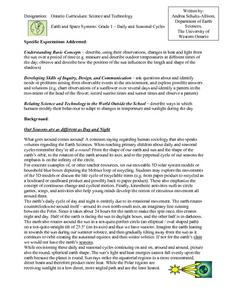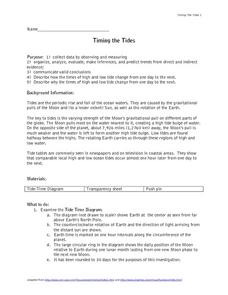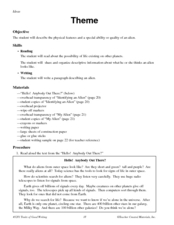Curated OER
Earth Day Trash Survey Unit
Pupils analyze the data from questionnaires to prepare a report. They distribute the report via e-mail or through a report published on a Web page to those who participated.
Curated OER
Earth Day Trash Survey Unit
Students develop a questionnaire to distribute via e-mail or Web page forms that visitors fill out based on the data they gathered during their clean-up activities.
Curated OER
The Water Cycle
Students are introduced to the components and importance of the water cycle. They are shown how groundwater moves using a model. Students list 9 places on earth where water is found. They define the terms cycle and water cycle.
Curated OER
It's a Gas! Or is it?
Students describe the effects of temperature and pressure on solubility of gases and other materials. In this investigative lesson plan students read an article and answer questions about it.
Curated OER
How Can We Live Here? Life In Extreme Environments
Students explore the limits of life on Earth to extend their beliefs about life to include its possibility on other worlds. They investigate three hypothetical environments and the bacterial life forms that could exist on Earth.
Curated OER
Water, Water Everywhere
Young scholars explore water. In this water cycle lesson, students conduct a scientific investigation that requires build a terrarium models of the earth. Young scholars record their observations of the changes regarding water in the...
Curated OER
The Solar System
Learners describe the different bodies that make up our solar system, explain the place of our solar system within the Milky Way Galaxy and the universe, explain day and night and the Earth's movement, and describe the relationship...
Curated OER
Geometry of Radio Meteor Reflections
Ninth graders investigate and describe ways that human understanding of Earth and space has depended on technological development. They describe and interpret the science of optical and radio telescopes, space probes and remote sensing...
Curated OER
Science: Daily and Seasonal Cycles
First graders use their observations to describe daily and seasonal cycles. through a demonstration using a suspended ball and flashlight, they determine the time of day in various locations. Next, 1st graders participate in a...
Curated OER
Going My Way?
Students, in groups, study how a magnet works and how people use the Earth's magnetic field to orient themselves.
Curated OER
What are Rocks and Minerals? How can they help us?
Sixth graders investigate the difference between rocks and minerals. They name the three kinds of rocks (sedimentary, igneous, and metamorphic) and know the differences between them.
Curated OER
Seasons
Students identify and define the vocabulary words: summer, spring, fall, and rotation. They describe how the earth's rotation affects the seasons. Students match appropriate clothing with each season. They discuss why a particular...
Curated OER
Earthquakes and Volcanoes
In this earthquakes and volcanoes worksheet, students will review how volcanoes are formed and where they are found. Students will describe earthquakes and their magnitudes. Students will use a table to answer questions about tsunamis....
Curated OER
Timing the Tides
Students collect data and describe how and why the high and low tides change from day to day. In exploring tides activity students study tides by taking notes, recording data and analyzing their findings.
Curated OER
Weather Tools
Learners explore Earth science by participating in a weather identification activity. In this scientific instrument lesson, students identify several weather related tools such as the weather vane, thermometer and rain gauge. Learners...
Curated OER
Water and Ice: Part 1
Students observe the state changes in water. In this matter lesson, students observe, measure, and describe water as it changes state. Students explore how water can change from a solid to a liquid then back again. They journal their...
Curated OER
Theme
Young scholars examine a reading selection. In this descriptive writing lesson, students read an excerpt from "Hello! Anybody Out There?". Young scholars discuss the idea of aliens living on other planets, describe what they think an...
Curated OER
How Does Your Magma Grow?
Students identify the three types of plate boundaries and the Earth's tectonic plates system. They examine how the Galapagos Islands were formed and hydrothermal vents.
Curated OER
African Savanna
First graders are introduced to the ecosystems of savannas throughout the world. Using new vocabulary, they identify and describe the characteristics of a savanna and the animals that live there. They also describe the Earth's physical...
Curated OER
Is It Getting Hot In Here?
Students describe several factors and ways climate change could effect communities. In this climate change activity students research climate change and complete a worksheet.
Curated OER
Ancient Hunters of the Great Lakes
Students describe theories on how the first humans came to America and show the evidence that supports it. In this investigative lesson students study given material and prepare written or oral reports in their groups.
Curated OER
Our Solar System
Third graders describe the composition of our solar system. They recognize the names of the planets in our solar system and compare and contrast the nine planets that orbit the sun.
Curated OER
Climate Patterns across the United States
Young scholars articulate differences between climate and weather using examples in a written statement. Using climate data from across the country, they describe climate patterns for various parts of the United States on a map. Students...
Curated OER
Driving Currents
Students conduct a variety of investigations to see how water, heat, and salinity affect the flow of the world's ocean currents,as well as, explore many factors that affect the flow of the world's ocean currents. They also describe in...

























